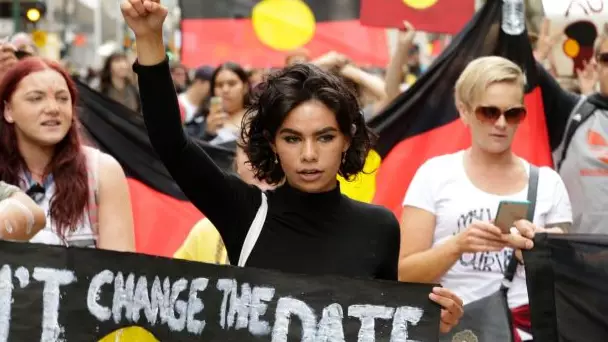
Police have warned people planning on attending large-scale protests during Australia Day tomorrow will incur a fine.
Currently, no more than 500 people are allowed at a protest in Sydney, but according to Facebook, more than 3,000 people have already clicked 'attending' an Invasion Day rally in the Domain.
NSW Police Minister David Elliott told 2GB Radio: "Unfortunately, anyone who attends tomorrow will be exposed to fines and imprisonment."
"We've issued a number of fines [in the past] and people have been before courts and people tomorrow will be exposed to fines because they'll be in breach of public health orders.
Advert
Elliott also took aim at ABC, after the public broadcaster referred to Australia Day as 'Invasion Day' in a guide that detailed events taking place on January 26, including the protest at the Domain.
"They are going to need to be called to account," he said.
"I can't believe any organisation, let alone one that pretends to advocate for Indigenous rights, would say, 'Let's put aside the risk of COVID-19, let's breach public health orders, let's get together despite the pleas of the community asking them not to get together," Elliot said.
Mr Elliott is adamant that the crackdown on protests on tomorrow isn't a racial issue.
Advert
"NSW Police have never told people they can't get together because the position they're advocating is unpalatable. We encourage people to express those views, that's what sets us apart from other countries," he said.
"Anyone who's claiming it's racial, that's absolutely nonsensical.
"You should be expressing your opinion to your local member, you should be expressing your views online, this year just isn't the year to [protest] unfortunately."
But instead said that people gathering together in excess of the legal amount is simply against the rules, regardless of the cause.
Advert
"Nobody understands the plight of the Indigenous people, nobody's more sympathetic than me," he said. "But having an illegal protest that is going to endanger the lives of those that attend the protest ... is not the way to go ahead.
"It is tantamount, in my mind, to neglect."
Following the ABC referring to January 26 as Invasion Day, opinions have been fiercely divided.
Advert
The national broadcaster had explained to reporters and writers that they will be allowed to use that term in their reporting, as well as Australia Day and January 26.
Because people in the community use it to refer to the annual public holiday, the ABC said it would be 'inappropriate' to only use Australia Day.
People were shocked and surprised when the broadcaster uploaded an article with the headline 'Australia Day/Invasion Day 2021 events for Sydney, Melbourne, Canberra, Brisbane, Perth, Adelaide, Hobart and Darwin'.
It was instantly hit with comments from people suggesting the ABC was needlessly trying to stoke enragement.
Advert
The ABC has since issued an editorial note on its website that goes into further detail why the Invasion Day and Australia Day terms will be used interchangeably.
It starts by saying the public holiday is legislatively referred to differently in each state and territory. New South Wales calls it Australia Day, while South Australia labels it 26 January.

"Legislative use is one perspective," the ABC explains.
"By way of contrast, government websites listing public holidays tend to use 'Australia Day' in first reference, regardless of what the holiday is called in the relevant Act.
"It is important to note, though, that both the Macquarie and the Australian Concise Oxford dictionaries list 'Survival Day' and 'Invasion Day' as roughly synonymous with 'Australia Day', either as 'viewed by Indigenous people and their supporters' (Macquarie).
"Both terms have a long history of use in this country: the Australian National Dictionary dates both to the 1980s. A precursor for both terms would be the 1938 announcement by Indigenous groups that January 26 - not then a national public holiday - be known as a Day of Mourning and Protest."
The ABC added that because there are multiple ways of describing the day, it would only be fitting that they would reflect that in their reporting.
They insist that 'Australia Day' is the default for describing events or feelings around January 26, however, staff are allowed to use other accepted terms 'at their discretion'.
Featured Image Credit: Creative CommonsTopics: Australia